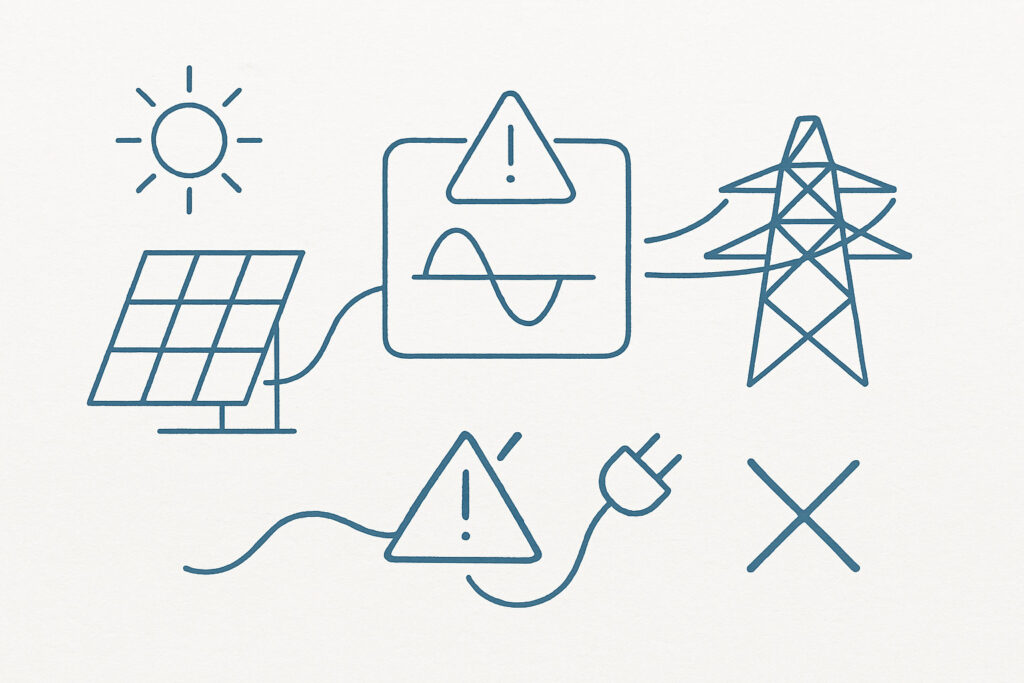This article originate from my contributions to Energiris, a Belgian citizens’ cooperative committed to accelerating the energy transition. As part of our mission to inform and raise awareness among both co-owners and the general public, we regularly publish educational content on topics related to sustainable energy.
The original article was published in French and Dutch, reflecting the multilingual context of our cooperative. By sharing them here in English, I also wish to reflect my personal commitment to a more sustainable and better-informed society.
Based on an article published by « Renouvelle » – November 28, 2023
As rooftop solar installations expand across Wallonia, a technical issue is surfacing that can undermine production efficiency: inverter disconnection due to network saturation. This phenomenon affects both the grid and those who invest in solar technology, raising important questions about equity and infrastructure.
What happens when an inverter disconnects?
When many solar systems are connected to the same local grid point — typically a distribution cabin — the surplus electricity injected during peak hours can cause overvoltage. In response, inverters automatically disconnect to protect the network and connected homes. During this downtime, households are unable to use their solar production and must draw electricity from the grid.
Financial consequences for prosumers
For the prosumers affected, this leads to:
- A halt in solar energy production
- Increased reliance on grid electricity
- A negative impact on energy savings and return on investment
To partially offset this, the Walloon electricity regulator Cwape has proposed an annual compensation of up to €480 for those experiencing repeated inverter disconnections.
Potential solutions to mitigate the issue
Several technical and behavioral responses are being explored:
| Solution | Description |
|---|---|
| Financial compensation | Temporary aid to cover lost production |
| Higher self-consumption | Using energy during daytime (some turn to batteries) |
| Grid reinforcement | Ores plans to invest €4 billion over 10–15 years |
| Flexible consumption | Automating devices to activate during solar peaks (e.g., EV charging, laundry scheduling, downsized inverters) |
These flexibility measures are faster to implement, more affordable, and environmentally responsible — but they require both technical support and consumer awareness.
Collective approaches and energy communities
To encourage smarter consumption and ease grid pressure, Wallonia’s evolving tariff structure incentivizes time-based energy use. Meanwhile, the emergence of energy communities and solar energy sharing models offers new opportunities to balance loads locally and improve overall grid resilience.
Integrating technology with intelligence
Inverter disconnection is a technical symptom of a broader challenge: how to harmonize local production with collective infrastructure. The energy transition depends not only on the deployment of renewables, but on thoughtful integration and flexible collaboration across stakeholders.
Personal reflection
This issue shows that the energy transition is not just about deploying solar technologies — it’s about how we integrate them into existing systems and how citizens, grid operators, and policymakers work together to adapt.
As someone deeply interested in sustainable energy and committed to sharing knowledge that supports smarter decisions, I believe we need to embrace local flexibility, collective intelligence, and a more nuanced understanding of how technical solutions affect real lives. Addressing inverter disconnection is a concrete example of the kind of challenges we must tackle, not only with infrastructure, but with cooperation and foresight.
Beyond my role at Energiris, I place great importance on sharing knowledge. I have always considered education to be an essential tool for helping everyone better understand energy issues and the concrete solutions available to us. Sharing what I discover and making complex topics accessible to others is also my way of contributing to a fairer, more inclusive transition.

